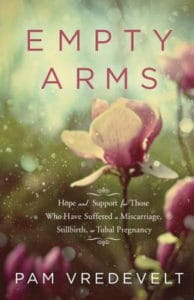The director led me from the green room and onto the talk show’s set, where I was greeted warmly by the show’s host. In moments we would be live across the nation, and I was already on high alert.
Yet nothing could have prepared me for what came next.
The show host looked into the camera and introduced me: “Pam Vredevelt is with us today. Pam is a professional counselor and the author of Empty Arms: Hope and Support for Those Who Have Suffered Miscarriage, Stillbirth, or Tubal Pregnancy.”
Then he turned to me and said, “Pam, you talk about miscarriage and stillbirth in your book, almost as if someone has died.”
I was stunned.
Almost as if someone has died?
Did he really just say that?!
Gathering my wits, I replied carefully, “Yes, that’s right. Someone precious did die. Our baby.”
I don’t believe that the intention behind that statement was malicious, but the words packed a hefty punch nonetheless. More than likely, the host just didn’t know much about the topic or hadn’t given careful thought to what he wanted to say.
Unfortunately, unintentionally hurtful words said to those who are grieving are more common than many of us realize. And I’m doing what I can to reverse that trend.
Suffering in Silence
A first step forward is to be aware of the facts surrounding the loss of a child. Each year in the United States:
- 1 million expectant mothers suffer a miscarriage.
- 1 out of 4 pregnancies end in miscarriage.
- About 24,000 babies are stillborn.
- 3,600 babies are lost to sudden unexpected infant death syndrome (SUIDS).
- Every baby that dies, on average, leaves behind at least five grieving loved ones – including parents, grandparents, siblings and friends.
These expectant mothers carried the life of their precious little one within them for weeks, months and – for some – full term. They began bonding with their baby the moment they found out they were expecting. And now their hearts, and the hearts of those around them, are cracked wide open.
I can tell you, based on my personal experience and from the stories of thousands of women I’ve met in a counseling office, that there are few things worse than being around others who are aware of your loss yet don’t acknowledge it.
It’s sad, but common. People often avoid those who are grieving – or avoid the topic of their loss – simply for fear of saying the wrong thing. While the motivation can be well-meaning, it leaves the one whose heart is hurting to suffer alone in silence.
And that’s a dark and scary place to be.
Offer Help and Healing
October is National Pregnancy and Infant Loss Awareness Month – an opportune time to honor the lives mourned by your friends and family members. Remember that, for every child who relocates to heaven, there are others left behind to grieve deeply (parents, siblings, grandparents).
You are strategically positioned to speak words of hope and healing to mourning hearts. Here are two simple ways you can help them heal:
- Share words that applaud their resolve to courageously press on in the face of such overwhelming sadness.
- Share words that let them know you are mindful of their heartache and care about how they are doing.
If you find yourself staring at a blank screen or an empty piece of paper, just wondering how to begin, here are some suggestions to spark your creative flow:
- Thinking of you today, sending comfort and love.
- I will do all that I can to help you find your way through this. You are not alone.
- Be gentle with yourself and give yourself grace. It takes time to mend a broken heart.
- Give yourself permission to take good care of yourself.
- I’ll stick with you until the light shines again in your heart.
- It’s OK to not feel OK. Even as you rightfully grieve, please know that you are deeply loved. I care about you.
- I see a fierce resolve inside you, mightier than your grief.
- Your courage to keep going in the midst of overwhelming sadness is a strength like no other.
- Your story matters. If there’s a time that seems right to you, I invite you to share yours with me.
- I’ll cry with you until we run out of tears. We’ll walk the healing path together.
- Healing happens as we live in the grace of the day.
- Because someone we love is in heaven, there’s a little bit of heaven in our hearts.
- “How very softly you tiptoed into [our] world, almost silently, only a moment you stayed. But what an imprint your footsteps have left upon [our hearts].” –Dorothy Ferguson
- “What we once enjoyed and deeply loved we can never lose. For all that we love deeply becomes a part of us.” –Helen Keller
- “Some say you’re too painful to remember. I say you’re too precious to forget.” – Anonymous
- “The Lord is near to the brokenhearted and saves the crushed in spirit.” –Psalm 34:18
- “I will give you the treasures of darkness . . . that you may know that it is I, the Lord, the God of Israel, who call you by your name.” –Isaiah 45:3
Validating Grief With Compassion
When you send healing words to those who have lost a child, you open the door to authentic communication about life’s adversities. You also model and sensitize them to ways they can make a positive difference in the lives of others.
Grief doesn’t need a solution. It simply needs to be noticed and validated by your compassion.
We have an opportunity to comfort those who mourn with the comfort we’ve received. There are healing words that can onlycome from you. And there’s no better time than now to reach out and help mend a broken heart.

Empty Arms
With the warmth and compassion of a Licensed Professional Counselor and writing as a mother who has suffered the loss of a baby and a 16-year-old son, Pam Vredevelt offers sound answers and advice. As an expert in love and loss, Pam gives reassuring comfort to any woman fighting to maintain stability and faith in the midst of devastating heartbreak. Empty Arms: Hope and Support for Those Who Have Suffered a Miscarriage, Stillbirth, or Tubal Pregnancy is the essential guidebook for anyone suffering the agony of losing a baby.
Buy Now
Book















